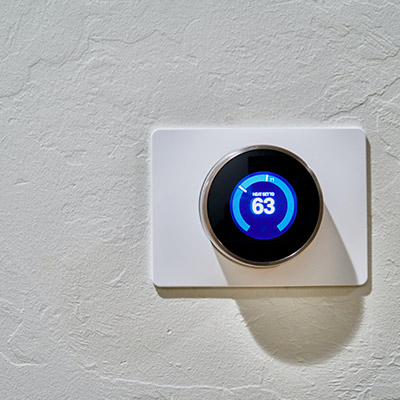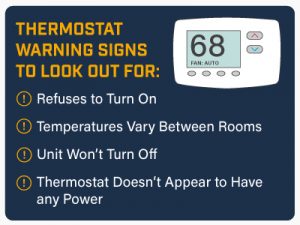
With temperatures dropping, and more Portlanders begin turning on their residential heating and cooling systems, residents start asking, “Do home thermostats go bad?” Our Portland HVAC contractors have found that while the lifespan of thermostats vary, many units start to show signs of decline after about ten years. Are you looking for more info on your programmable or manual thermostat? Want to stay on top of warning signs? We share details and tips below!
What Causes a Home Thermostat to Go Bad?
 A faulty thermostat can impede proper heating during the winter months, as well as hinder cooling during the summer. There are a variety of reasons why your residential thermostat might start malfunctioning. Often the units have reached the end of their lifespan, are experiencing wiring issues from wear and tear, or have a large amount of dust accumulation within the console.
A faulty thermostat can impede proper heating during the winter months, as well as hinder cooling during the summer. There are a variety of reasons why your residential thermostat might start malfunctioning. Often the units have reached the end of their lifespan, are experiencing wiring issues from wear and tear, or have a large amount of dust accumulation within the console.
If you suspect your thermostat might be on its last legs, here are some warning signs to look out for:
- Air Conditioner or Heater Refuses to Turn On: If your home A/C or heating unit doesn’t kick on, there could be a wiring issue in the thermostat. Damaged wires can hinder electrical signals, which prevent your heating and cooling system from turning on. Bad wiring can be dangerous, so let our residential HVAC maintenance team professionally assess the situation.
- Temperatures Vary Between Rooms: If you notice inconsistent temperatures from room to room, this could indicate a broken thermostat. However, keep in mind if your HVAC unit relies on a zoning system, fluctuating temperatures are expected. In this case, you might need to reconfigure your settings if they don’t meet your comfort needs.
- Heating or Cooling Unit Won’t Turn Off: Does your residential HVAC unit continuously run, despite having been turned off? This could be a sign of frayed wiring in your control system. Our Portland HVAC installers can examine your thermostat for defective wiring and check to ensure the control system is calibrated correctly.
- Thermostat Doesn’t Appear to Have any Power: An unresponsive or powerless thermostat is an apparent sign of a problem. If you try to push buttons and there is no change, or the display is dimmed, chances are the unit is broken or might need new batteries.
When Should You Replace a Home Thermostat?
If you are experiencing any of the above issues, it might be time to consider a new control system. However, there is some troubleshooting you can do first to determine if a new thermostat is necessary:
- Make sure your thermostat is set to “heat” during cold months or “cool” during the summer. Check to make sure you have your unit set to “auto” instead of “on.”
- Replace the batteries on electric units and check for power.
- Clean your manual thermostat by removing the cover, and remove any dust with a small cloth.
- Adjust the temperature up or down by five degrees and see if your HVAC unit and supply registers respond.
If none of these troubleshooting tips work or you’re unsure where to start, it’s time to call in an expert. Our team of residential heating and air conditioning experts can test your thermostat and replace your wall unit if necessary. We can also determine if you might have broader HVAC issues causing heating and cooling problems.
AAA Heating and Cooling’s Residential HVAC Services in Portland
Are you in need of a home thermostat replacement? At AAA Heating and Cooling, our NATE-certified technicians will diagnose and solve all your HVAC issues, including control system services. Need help in a pinch? We also provide 24-hour emergency assistance should you find yourself in immediate need.
Contact us today to schedule your residential heating and cooling repair or maintenance.